Euro 2020: Croatia Water Polo Tops Montenegro in Dramatic Finish
January 16, 2020 - The Croatia water polo team met Montenegro in the second leg of the European Championship in Budapest on Thursday.
In the first match, the ‘Barakudas’ defeated Germany 17:9. The match against Montenegro was decisive to win the first place in the group, which secures a spot in the quarterfinals.
“We have really positive results against them lately. We easily won in the quarter-final of the Kazan World Championship, in the semi-final of the Olympic Games, the quarter-final of the European Championship, some big matches where we had them as an opponent and we managed to win,” said national team coach Ivica Tucak just before the start of the match.
Montenegro opened the game with a goal by Brguljan three minutes in. Croatia’s first goal of the match didn’t come until Andro Buslje scored for 1:1 with less than two minutes to go in the first quarter.
Luka Bukic scored during an extra-man play for 1:2 Croatia, which was the final score of the first quarter.
Bukic opened the second quarter with his second goal for 1:3. Maro Jokovic nailed the net for 2:4. Xavi Garcia increased Croatia’s lead to 2:5, while Josip Vrlic was brilliant in front of the goal for 2:6. The second quarter ended at 3:6 for Croatia.
Croatia’s brilliant defense prevented Montenegro from reducing the result in the third quarter, and goalkeeper Marko Bijac was unstoppable in goal. Croatia scored the first goal of the third quarter with four minutes to go - Luka Loncar increased the lead to 3:7.
Hrvoje Benic hit a rocket for 3:8, while Bukic recorded his third goal with just over two minutes to go in the third quarter. The game was 4:9 for Croatia.
With less than two minutes to go, Vrlic scored his second goal of the game for 5:10, which was the final score of the third quarter.
Montenegro reduced the deficit to 8:10 four minutes into the last quarter. And it was 9:10 with three minutes to go. Croatia had yet to score in the fourth quarter.
Montenegro made an incredible comeback to equalize with just over two minutes to go. It was a completely different game for Croatia, and Tucak was not happy.
Xavi Garcia scored a crucial goal with just over a minute to go to put Croatia back in the lead for 10:11, but they weren’t out of the woods yet.
Bijac, however, made an incredible save to crush Montenegro’s hopes. The game ended at 10:11 for Croatia.
Croatia will play its final game of Group A against Slovakia on Saturday at 4 pm.
To read more about sport in Croatia, follow TCN’s dedicated page.
Euro 2020: Croatia Handball Tops Austria 27:23, One Step Closer to Semis
January 16, 2020 - The Croatia handball team opened the second round of the European Championship against Austria on Thursday.
The Croatia handball team and Austria met in Vienna on Thursday to open the second round of the Euros. Croatia had the support of Croatian fans in the stands.
Both teams transferred two points to the second round, and with a win, would be one step closer to Sweden and the Euro final.
Austria had the first attack of the match in front of a roaring arena boasting 9,500 spectators. The commentators were confident at least half were Croatian.
After an unsuccessful Austria attack, Horvat missed from seven meters during the first Croatian attack. The game was still 0:0 three minutes in.
However, it was the captain to score the first goal of the game moments later - Duvnjak scored for 1:0.
Mandic increased the lead to 2:1 in the 5th minute, and Cindric scored for 3:1 in the 6th minute. Austria equalized in the 7th for 3:3.
Austria took the lead in the 8th minute thanks to a goal from 7-meters, though Mandic equalized in the 11th for 4:4. Croatia retook the lead thanks to a Horvat goal moments later, and Karacic scored for 6:4 in the 13th minute.
Cindric increased the lead to +3 in the 14th (7:4), and Duvnjak made it 8:4 in the 17th minute. Horvat nailed another shot from 7-meters for 9:5 in the 20th minute, and another in the 21st for 10:5.
Cindric scored in the 25th minute for 11:6, and Stepancic made it 12:7 with two minutes to go before halftime. Cindric scored right before the buzzer for 13:8.
Croatia opened the second half with a Stepancic goal for a +6 advantage in the 30th minute. Horvat scored yet another 7-meter shot for 15:9.
Stepancic scored for 16:11 in the 34th, and Mandic scored for 17:12 in the 36th. The Croatia captain made it 18:13 moments later.
Mandic continued his scoring streak for 19:14, and the two nations had been playing goal-for-goal for most of the second half.
Horvat nutmegged the Austria defense to bring Croatia back to +5, and Stepancic scored for 21:16 in the 42nd.
Cindric was on fire with another goal at 97 km/hour for 22:16, and Duvnjak brought Croatia back to +6 for 23:17 in the 44th. By this point in the game, Croatia had blocked four shots to Austria’s one, while Sego had made 5/17 saves in the game thus far.
A new 7-meter shot for Croatia saw Horvat lob the ball over the keeper for 24:18. Austria reduced their deficit to just four goals in the 51st.
Sipic scored for 25:20 in the 54th, and Duvnjak intercepted the ball for 26:20. With a minute to go, Karacic scored for 27:22. The final score of the game was 28:24 for Croatia.
Luka Stepancic was named the man of the match!
The 'Cowboys' next game is against Germany this Saturday at 8:30 pm.
To read more about sport in Croatia, follow TCN’s dedicated page.
Euro 2020: Croatia Women's Water Polo Team Tops Serbia, One Step Closer to Quarterfinal
January 16, 2020 - In the third round of Group A at the European Championship, the Croatia women's water polo team defeated Serbia 9:8 (2:1, 2:3, 3:3, 2:1) and made a significant step towards reaching the quarterfinal.
Emma Miljkovic and Ivana Butic scored two goals for Croatia, while captain Dina Lordan, Ana Miroslavic, Ema Carevic, Matea Skelin and Domina Butic added one goal each.
Alexandra Ratkovic was brilliant in goal with seven saves, including defending a crucial 5-meter shot 63 seconds before the end of the game with Croatia leading 9:7.
Croatia started the match better and led by 4:2 with three minutes remaining in the first half. Still, Serbia scored for 5:4 from a three-goal series at the start of the third quarter. The decisive period for Croatia's victory was from the 24th to the 28th minute, when, with three consecutive goals from Marija Caleta, they turned the game from a 6:7 deficit to a 9:7 lead.
Sixty-three seconds before the end, Serbia failed to score from 5-meters when the brilliant Ratkovic defended Jelena Vukovic’s shot. By the end of the match, Serbia managed to make it a one-goal-game but failed to equalize in the last attack.
In the first two rounds of Group A, the Croatian side lost to favorites Hungary and Greece. Serbia also recorded two defeats to Greece and Russia, making this game extremely important in the fight for fourth place, which is the last spot leading to the quarterfinals.
By the end of the competition in Group A, Croatia will play Russia on January 17th and Slovakia on January 19th. A defeat against the extremely strong Russians is to be expected, though our girls have a great chance to win in the last match against Slovakia and thus secure the quarterfinal match.
After the 3rd round, Croatia is in fourth place with three points. Greece and Hungary lead the Group A rankings with nine points each, followed by Russia with six points each. In fifth is Serbia and in sixth Slovakia without a single point.
Source: HRT
To read more about sport, follow TCN’s dedicated page.
Croatian Peruvian Returns to Homeland Starts Design Business
Dragitza is a brilliant young Croatian Peruvian who decided to seek a better life in her homeland. She started her own business, has a stand-up comedy act and is a finalist on a popular TV cooking show.
Founder of Puro Amor Design in Zagreb
You may not have heard of Dragitza Rastegorac yet, but you have probably heard of the brand Puro Amor Design, which has been selling cups with wacky and personalized labels for a while. This 29-year-old was born and raised in Peru, but her Croatian roots brought her back to the region her family came from. She recently spoke to Veronika Švob/SUPER1/Telegram about life in Zagreb, her first job, stand-up comedy and her current business over coffee at Cogito Café on Deželićeva Ulica.
Dragitza was born and spent 26 years of her life in Lima, the capital of Peru. Her father is originally from Kupres and her mother is from Bugojno, so when she turned nine, she had the opportunity to spend two years in Croatia before returning to Peru again. After graduating from high school and college in Lima, Dragitza decided that she no longer wanted to live Peru and decided to come to Croatia.
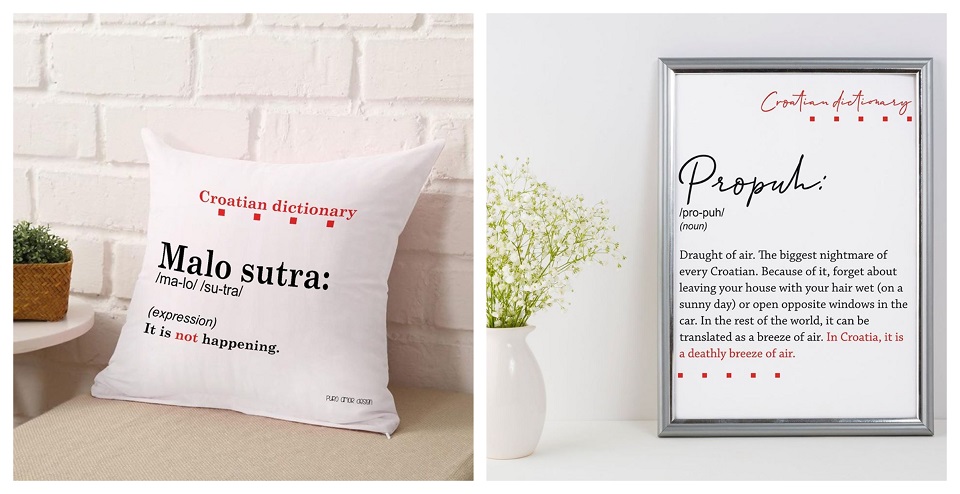
Puro Amor Design | Facebook
Left Corruption and Poverty in Peru for Better Croatian Life
"After graduation, I didn't even look for a job there, but came to Zagreb. The people of Lima most often go to Argentina to look for work or further education, but I did not want to go that route. Something drew me to Croatia.”
She claims that it was not because of the people and adds that the Peruvians are very warm and know how to socialize with others, but Lima is a very unsafe place to live.
"There is so much poverty, and corruption which does not benefit people at all, and I simply felt that I did not belong there. While I was growing up, we often spent time in Croatian emigrant social circles. Most of those Croats had arrived in Peru after the Second World War and were already third generation. I am second generation, for example.”
“I studied communication science, and the course of study is quite different than that in Croatia. I learned a lot about advertising and graphic design. After I completed my degree, I applied for a scholarship in Croatia, which was not difficult to get, because there are plenty of openings. I think the goal is to encourage Croatians to eventually return from abroad. Not all of them stay, of course, and some only come for a year or two.”
She first came alone, lived in a dormitory on the Sava, and met a lot of people from Peru, Argentina and Canada at that time.
Studied Croatian As Scholarship Student in Croaticum
“I studied Croatian through the Croaticum program at the Filozofski Fakultet (Faculty of Philosophy) and it was quite challenging, but I believe it is currently the best program for learning Croatian. It was not my first contact with the Croatian language because I came here at the age of nine and went to school here for two years.”
She spoke Spanish all her life, but what she had learned as a child helped her a lot. "The Croatian language is very difficult, it is really demanding, especially when it comes to the cases. I can't compare it to Spanish at all.”
She speaks Croatian very well today, adding that she still messes up the cases sometimes. After her classes ended, she stayed in Croatia for another month before returning to Lima. But then she came back to after half a year and knew then that she wanted to stay Croatia. "I had a great roommate from Slavonski Brod and met a lot of foreigners, somehow it all fell into place."
First Job as Manager at Museum of Illusions
"My first job in Zagreb was at the Museum of Illusions. I saw an ad saying that they were looking for someone who spoke English and that Spanish was an advantage. I applied for this job thinking that I would be the guide in the museum, not run the whole museum. However, it turned out that I became manager of the museum and stayed there for about a year.”
She points out that it was no problem for her to get the job, and that she rejected as many as two offers in the meantime.
"Many thought I got the job through a relationship, but I really didn't. After a year at the museum I was working on another project for them, but it didn't work out very well and I was glad when I got fired. Everyone around me was amazed to see that I kept a smile on my face, but I just had to.”
She had her own business plan in mind by then, or rather she had just begun thinking about it, but hadn’t done anything yet.
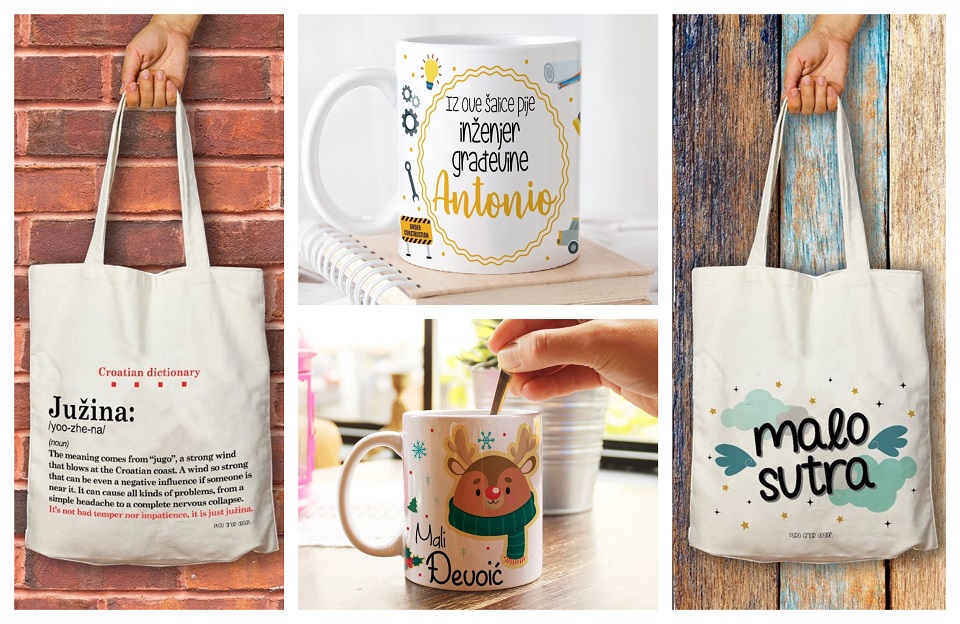
Puro Amor Design | Facebook
Created Business Plan Out of Love for Collecting Cups
She first came up with the idea of making cups because she collected them. “I was constantly searching for cups with Croatian inscriptions and could not find them anywhere. Now there are several cups, but at that time I couldn't find anything interesting.” It occurred to her to start making them herself, so she began with drawings, and was somewhat inspired by the Spanish brand Mr. Wonderful, which does similar work in all languages. "So, I started and showed my friend some ideas and she really liked them.
"My dad lent me money to print the first 250 pieces, I opened a Paušalni obrt (or lump sum business – I still don't know exactly what that means, but I am a lump sum) and started the business.”
After she reached out to the Instagram profile @zagrebfacts as it offered her a lot of Zagreb slang expressions; people started inquiring. "That was two years ago, I remember that I had sold almost a hundred pieces in just a few days. That early success fueled my motivation to continue. "
After that, she bought her first printer, then a second and third. She started her business in a room in a rented apartment and eventually moved it into the living room. "My emphasis is on personalized mugs, and I offer customers five options to choose from. Then Mother's Day came, and the business simply swelled to such an extent that shops started contacting me with their orders.” Then the media became interested and there were competitions. She even tried to work with Croatian influencers, but that did not progress. However, she had the great fortune of opening a showroom in on Jurišićeva Ulica.
Opened Puro Amor Design Shop on Jurišićeva Ulica
"I am here alone most of the time. My best friend helps me, and everything goes from production to sale here." Although she started with cups, she began producing canvas bags and feathers last February, and next February she expects to continue with t-shirts and hooded sweatshirts. Now she is making a decent living. "I do not expect to make a fortune, but I think something like this was needed in Croatia. At least that’s how it turned out for now.” You can follow Puro Amor Design on Facebook and Instagram.
Moonlighting as Stand-Up Comedienne at Studio Smijeha
She also took acting classes in Peru and was part of an acting ensemble, Dragitza has a few plays behind her. "This is one of the reasons why I wanted to go to America after college. I even auditioned for the New York Conservatory for Dramatic Arts, which is quite demanding but too expensive, so I gave up. It was a good confirmation to me that I have talent, so when I came to Zagreb, I enrolled in Studio Kubus, but realized that it was quite difficult for me to act in Croatian.”
Shortly after, she found a stand-up workshop at Studio smijeha (Studio of Laughs) and decided to go there.
"Marina Orsag told me that I was very endearing, that I had a super accent, and advised me to write some text. She soon asked me when I was planning on performing on open mic, and although I was excited, I didn't tell anyone I was going to do it. The show turned out great, and the crowd was roaring with laughter. The topics revolved around my parents, life in Zagreb, about being told that I’d never find a job here, and about some of my observations as a foreigner."
She also draws his inspiration from her love life, which she says is totally chaotic. "Well, I borrow stories from girlfriends, funny down-to-earth stories but I'm pretty focused on women's topics. From PMS to the gynecologist.” She doesn't write as often as she would like but hopes to hold a new performance every month. "A lot of people come to listen to stand-up, it's brilliant to realize that you can make people laugh. I'm an optimistic person and see good things in everyone. I'm a positive person by nature."
In her free time, she goes to Praćka for karaoke, while she chooses Katran for dancing. "Well, that was a bit of a shock to me. In Peru, you dance wherever you go but there’s nothing here. It's so hard to get people to move around here. And at first, I went to Latin American dance events, because I missed them so much.”
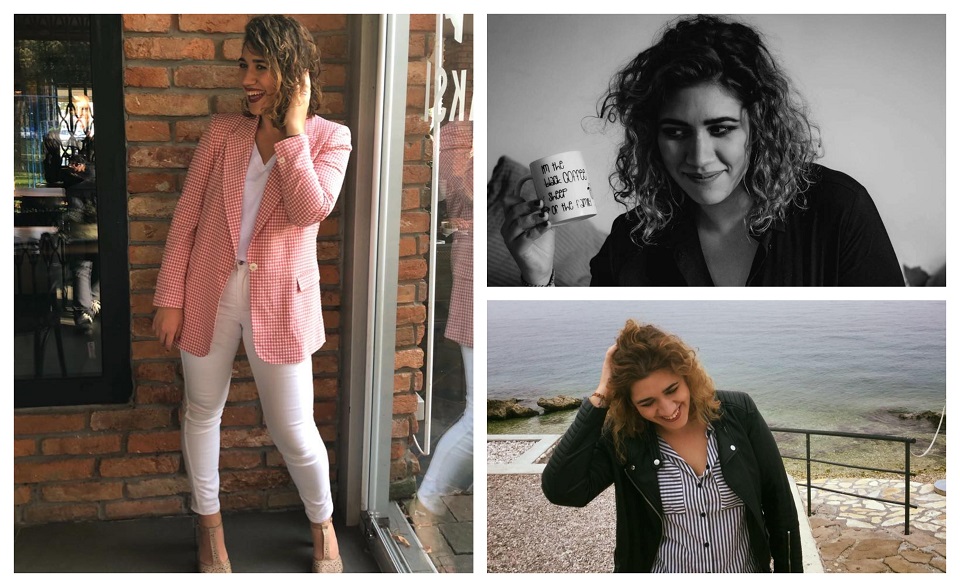
Dragitza Rastegorac | Facebook
Made it to Semi Finals on Popular Cooking TV Show
She loves to cook, mostly Peruvian cuisine, and her mom sends her spices regularly to make those dishes work. "We eat very spicy foods, and prepare meat for a long time, and coriander and yellow chili are my favorite spices." She admits he does not excel in preparing fish. In Peru, raw fish, known as ceviche, is one of the most famous dishes. "From Croatian cuisine, I love pate, beans and greens and Istrian specialties which my roommate’s mom sends." Dragitza also recently made it to the semi-finals on the TV show Kuhan i pečen (Cooked and Baked).
"She likes the pace of life here. Zagreb is not that big of a city and I can get everything done in one day. The only sad thing for me is that Croatians want to leave the country and they often tell me that I won’t stay here for very long. I don't think they appreciate what they have, but I don't know. And it wasn't that easy for me to start this adventure. There were days when I only sold one or two cups, but if you are persistent and if you work hard, there is no door that won’t open. Croatians do not consider the option of starting their own business after graduation, while that is common practice in Peru. If you don't find a job, you can figure out one out for yourself. I have a dozen more ideas, but don't have time for everything.”
Well, Dragitza is a good example of commitment all the way to the finish line, and nothing can stop her. She's truly inspirational.
Follow our Made in Croatia page and Diaspora page to keep updated on Croatia returnees, their business ventures and successes.
Croatian Vice Presidents Receive Taxpayer Funded Audi A6 Luxury Cars
Croatian taxpayers are financing new expensive Audis for three parliament vice presidents. The monthly payment for each car equals the average Croatian citizen’s take-home pay. The brand-new cars were delivered in December 2019, came with 60-month contracts and a monthly installment of 5541 HRK (744 EUR) per car.
Three of Five Vice Presidents Accepted Audi A6
Three of the five deputies in Croatian Parliament accepted and are driving brand new Audi A6 cars, the Croatian Parliament press office confirmed to Hina. The new cars were offered to four vice presidents, as Božo Petrov (Most) had refused an offer to use an official car earlier.

Željko Reiner (HDZ), Furio Radin (NZ) and Siniša Hajdaš-Dončić (SDP) accepted state-funded Audi 6 luxury cars.
Three Vice Presidents accepted the luxury cars: Željko Reiner (HDZ), Furio Radin (NZ) and Siniša Hajdaš-Dončić (SDP). However not Milijan Brkić (HDZ) kept a previously financed Škoda Superb. Unofficially, Brkić will continue to use the official Škoda Superb, rejecting the new official Audi A6, a model purchased for the vice-presidents less than a year before the end of their terms, according to Novi List on January 15, 2020.
Petrov Does Not Want to Spend State Funds on Most
"I do not want to spend the financial resources of the state, or of all taxpayers, for Most’s party needs," explained Petrov, the only vice-president of Parliament who is also his party's president, in his official car waiver. The official car, he says, was returned a year ago, in January 2019, at the beginning of the European Parliament election campaigns, and he maintained this position during the presidential election campaign.
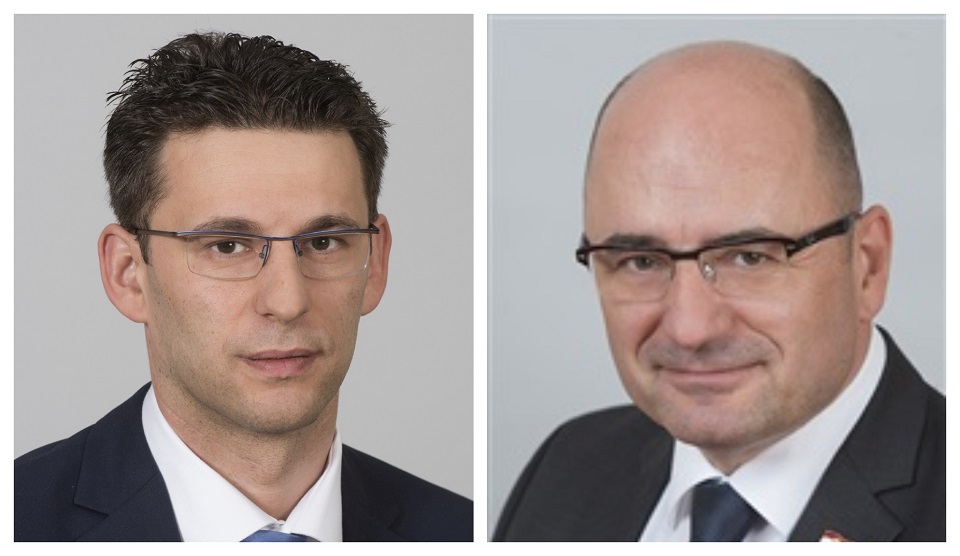
Božo Petrov (Most) refused Audi A6 and Milijan Brkić (HDZ) will keep state-financed Škoda Superb.
"It makes no sense for me to go around the country in a car which belongs to the state, and use it to promote the objectives of Most," Petrov said explicitly.
Parliament has not revealed the cost of the cars. However, they confirmed that the new cars were delivered in December 2019 after 60-month contracts were signed with a monthly installment of 5541 HRK (744 EUR) for each car. Multiplying the monthly payment by 60 months totals 332,460 HRK (44,654 EUR) for each car. Multiplying that total by three comes to a 997,380 HRK (133,961 EUR) bill for Croatian taxpayers to provide Reiner, Radin and Hajdaš-Dončić with luxury cars.
Vice Presidents Not Asked Before UZOP Audi A6 Procurement
The parliament deputies were not consulted before the new cars were purchased according to the press office statement. And parliament itself does procure them, nor does it manage the fleet for its own needs or those of parliamentary officials.
"These affairs are the responsibility of the Ureda za opće poslove Hrvatskog sabora i Vlade (Office for General Affairs of the Croatian Parliament) and the Government, which also manages the transportation for parliament officials, the government and all its offices, as well as the transportation of foreign delegations and protocol programs," the parliamentary press office explained regarding UZOP duties.
From 2014 to March 2019, UZOP had a “certain number of vehicles” at their disposal which were leased to serve the needs of users and the beneficiaries. These vehicle procurements are based on a public procedure and conducted by the Središnji državni ured za javnu nabavu (Central State Office for Public Procurement) and the framework agreement effective 2013.
In 2018, one year prior to the expiration of this contract, UZOP reported the need to procure new cars through financial and operational leasing to the Central State Office. They specified the car classes prescribed by the government and parliamentary decision on the conditions of use for official cars, mobile phones, etc. and guidelines for fleet management.
According to the decision, the vice presidents of the parliament have a right to use an official upper middle-class passenger category auto, according to the parliament statement regarding the length and details of the car procurement process.
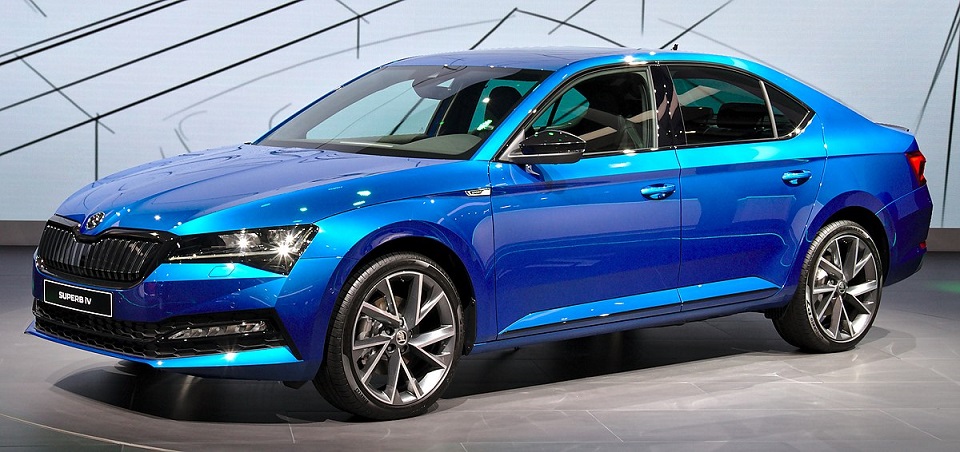
Škoda Superb with a 202,343 HRK (27,178 EUR) price tag.
UZOP Purchased 18 Škoda Superb Autos for Croatian Parliament
Since the public procurement procedures for new vehicles were not completed by end of March 2019, and the older purchased autos under previous contracts had to be paid off, several cars were rented for the interim. Those rentals ended on July 15, 2019 when 18 middle-class Škoda Superb cars were purchased with financial leases.
The parliament press office stated that the complete procedure for the procurement of cars, 27 different classes in this case, was according to regulations, to serve the needs all institutions under the jurisdiction of the UZOP and the Central State Office, which provided the technical specifications for the required car classes (engine power, accessories, etc.)
The Central State Office reviews and evaluates the tenders, makes the selection, and then concludes the framework agreement. Neither parliament, UZOP, nor future users of official vehicles influence this process, the press office emphasizes.
New Audi 6 Cars Shipped in December 2019
The procedure for procuring the Audi A6 cars was published in the Narodne novine (Official Gazette) on September 18, 2018, the car selection decision was made on May 2, 2019. The vehicles were delivered in December 2019.
Follow our Politics page to keep updated on the brands and models of taxpayer-funded cars that top Croatian government officials are driving.
Croatia Again in Top 10 Countries with Most Booking.com Awards
January 15, 2020 - Booking.com announced the winners of the Traveler Review Awards 2020. Croatia is once again among the top 10 most awarded countries.
HRTurizam reports that nearly one million awards (986,449) were awarded across 220 countries and territories. Among the ten countries with the highest award winners was Croatia, which boasts 42,763 winners.
The awards acknowledge these partners for their superior hospitality and for providing travelers with incredible experiences when booking accommodation.
Numerous countries and destinations continue to provide excellent service year after year, and in 2020, the countries with the most awards include Italy (130,253), Spain (66,755), France (61,492), Germany (49,777), Croatia (42,763), the United States (42,112), the United Kingdom (41,848), Poland (36,793), Russia (36,296) and Greece (33,259).
The spectacular increase in the number of award winners continues this year among apartments. This type of accommodation is again at the top of the list, accounting for almost 40% of winners among accommodation facilities globally in 2020.
For the third year in a row, they made up four of the five most awarded types of accommodation: apartments (380,936), hotels (179,869), private accommodation (94,162), weekend homes (82,241) and bed and breakfasts (75,875). In Croatia, the most awarded accommodation types are apartments (33827), private accommodation (3989), weekend homes (1555), villas (933) and hotels (729).
Although hotels are second in awards globally, three-quarters of all award-winning accommodations (75%) are made up of apartments and holiday homes and other unique accommodations, including options from boats and igloos to country lodging. A recent poll conducted by Booking.com on more than 22,000 travelers found that nearly two-fifths (39%) of global travelers prefer to stay in a weekend home or apartment over a hotel.
Dubrovnik, Zagreb, Opatija, Baska, Cavtat, Osijek, Cres, Korenica, Slunj, and Rakovica provided the warmest welcome on the Croatian market.
On the other hand, the top 10 Croatian accommodations to receive the Traveler Review Awards in 2020 are Apartment Spectre, Zagreb, Embassy Row BnB, Zagreb, Studio Makala, Trogir, Momentum Apartment, Split, Apartments Beso, Makarska, Luxury Apartment Dvor, Split, Apartment Roman Heritage, Split, Neretva Valley Apartments, Metković, Apartmani Nila, Pučišća, and PREMIUM, Osijek.
To read more about travel in Croatia, follow TCN’s dedicated page.
Euro 2020: Croatia Water Polo Opens with Big Win against Germany
January 14, 2020 - The Croatia water polo team opened their European Championship campaign against Germany in Budapest on Tuesday.
After difficult preparations, the ‘Barakudas’ opened the European Championship against Germany, the national team they last met in the World Cup in Gwangju.
“It's important to open the tournament properly. We have a solid and strong opponent at the start, Germany is all but a harmless team,” the Croatia coach said in an interview before the game.
“Germany is a good team and it is certain that we will have to be at our maximum to win,” said Croatia goalkeeper Marko Bijac.
“We know them well, they are unpredictable, as they showed at the World Cup. We must not enter the game relaxed and easy. I expect a physically difficult match,” added Maro Jokovic.
And Croatia made sure they stuck to their word.
Germany, however, was the first to score thanks to a Maurice Juengling goal. Croatia finally equalized after almost seven minutes when Josip Vrlic scored for 1:1. Marin Restovic brought Germany back into the lead for 2:1, which is how the first quarter ended.
At the opening of the second quarter, Lovre Milos made it 2:2. Denis Strelezkij returned Germany to the lead, though Andro Buslje scored the equalizer for 3:3. Milos' second goal finally gave Croatia the 3:4 lead and Hrvoje Benic gave Croatia a two-goal advantage (3:5). Ante Vukicevic scored for 4:6 and Luka Bukic for 4:7.
Thirty seconds into the third quarter, Croatia was up by four (4:8) thanks to Buslje’s second goal. The 'Barakudas' then became unstoppable, and Vukicevic scored for 4:9. Milos scores his third goal of the game for 5:11, while Loren Fatovic increased the lead to +7 (5:12). Fatovic closed the third quarter with another goal and a 5:13 advantage for Croatia.
At the start of the fourth quarter, Luka Loncar increased Croatia’s lead to 5:14, while Fatovic scored again for 6:15, and Bukic scored his third goal of the game for 7:16. Josip Vrlic made it 9:17 with one minute to go.
In the second round on January 16 (8:30 pm), Croatia will play against Montenegro. In the final match of Group A on January 18 (4 pm), Croatia will play against Slovakia.
Source: HRT
To read more about sport in Croatia, follow TCN’s dedicated page.
Todoric Family Struggling to Survive: Humanitarian Effort Launched
After Ivica Todoric revealed publicly that his family is struggling to survive, a Split association will organize a humanitarian effort this Sunday. Citizens can bring food, clothing and other supplies. The president of the association promised that he would deliver everything in person to Kulmorovi dvori on Monday January 20, 2020.
As reported by Lauren Simmonds/TCN, on January 9, 2020; Ivica Todoric, who is awaiting trial in Croatia, has alerted the media that he and his family are struggling to survive. His announcement has provoked quite a response because he was known to have been one of the richest people in Croatia for decades.
His words have been taken seriously by Jakša Bulić, president of the association for national development “Bili cvitak”.
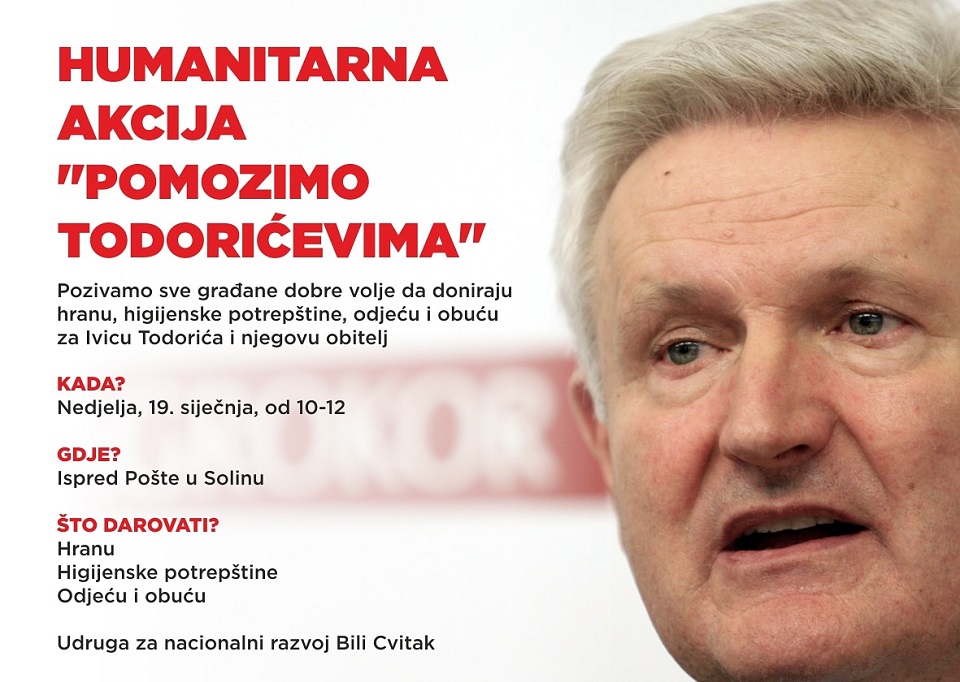
Bili Cvitak Launches Humanitarian Effort to Help Todorics
Therefore, he has announced a humanitarian effort "Let's Help the Todorics", which will be held on Sunday, January 19, 2020 in Solin. The association calls on all citizens of goodwill to donate food, hygienic supplies, clothing and footwear to Ivica Todorić and his family, according to Dalmacija danas on January 13, 2020.
“We have decided to launch "Let's Help the Todorics" a humanitarian effort for religious citizens and Catholics collect donations and supplies for the Todorics. On Sunday, January 19, 2020 we will collect everything from 10am to 12pm in front of the post office in Solin,” announced Jakša Bulić, president of the association.
Donations Will be Delivered to Todoric Residence on Monday
They group has already participated in various humanitarian efforts, such as an effort to build a school and a water supply system in Ogorje.
Citizens can bring food, shoes, clothing and other supplies, and the president of the association confirmed to Dalmacija danas that he will bring everything in person to Kulmorovi dvori, the Todoric residence, on Monday.
“It is up to Mr. Todoric whether he will accept our donations, but it is important for us as citizens to show our goodwill,” Bulić emphasized.
Follow our Lifestyle page to keep updated on the upcoming trial of Ivica Todoric.
Euro 2020: Croatia Handball Team Brilliant in Big Win against Serbia
January 13, 2020 - The Croatia handball team met Serbia for their final game of Group A in the European Championship on Monday in Graz. Croatia already secured first place in the group and a spot in the second round before Monday, while Serbia had no chance of moving forward regardless of Monday’s result.
Despite Croatia’s security in the second round, coach Lino Cervar did not want to disappoint Croatian fans and promised a solid Croatian side against Serbia.
Croatia started the game with the ball and Mandic scored for 0:1 in the first minute. Goalkeeper Sego made a few great saves to keep Croatia in the lead until the 5th minute, when Serbia finally equalized for 1:1. That didn’t last long, and Croatia’s Stepancic retook the lead in the 6th minute for 1:2. Radivojevic equalized in the 7th.
Croatia lost the ball moments later, which resulted in a Serbia counter-attack. Sego brilliantly defended to keep Croatia ahead. Karacic scored in the 8th minute for 2:3, and Stepancic for 2:4. Sego continued with his brilliant goalkeeping, and Duvnjak scored for 2:5 in the 10th minute. Serbia came back for 3:5 a minute later. Sego saved a penalty in the 13th, and Musa increased Croatia's lead to 4:6 in the 15th.
A 7-meter shot for Serbia in the 17th minute saw an equal score for the first time - 6:6. However, a Horvat shot put Croatia back in the lead one minute later (6:7). Stepancic scored for 6:8, though Serbia returned for 7:8. The game was equal again in the 21st, and Serbia took the lead for the first time in the 23rd minute for 9:8. In the 24th minute, it was 10:8 for Serbia.
Over the next few minutes, Croatia was unable to score. Approaching the 28th minute, it had been seven minutes since Croatia's last goal. With 9 seconds to go in the first half, Mandic hit the post to keep it 10:8 for Serbia.
Croatia opened the second half with a super save by Sego, and Cindric scored for 10:9 in the 30th minute. Serbia increased its lead to 11:9 in the 32nd, however, brilliant goals by Stepancic and Duvnjak put Croatia back in the game.
The Croatia handball team was awarded a 7-meter shot in the 36th minute, which Horvat scored for the equalizer (12:12). In the 41st minute, Serbia was back up to +2 (14:12). Sego's defense ensured it wasn't any higher, and Croatia came back to score for 14:12 in the 42nd.
An incredible counter by Duvnjak saw Croatia back in the lead - it was 14:15 in the 44th minute! Mandic increased the lead to 14:16, and Horvat made it 14:17 in the 46th minute. Sipic scored for +3 in the 48th and Karacic for +4 in the 49th (14:19). On fire from his last goal, Karacic scored again for Croatia's five-goal lead in the 50th minute.
Serbia unraveled under pressure, and Duvnjak scored for 15:21 in the 51st. Serbia began making a comeback, though a Cindric goal made it harder with a goal for 19:22 in the 56th minute. A Sego defense was followed by a Croatia counter-attack where Mandic was one-on-one with the keeper to score for 19:23. At this point, Croatia's victory was inevitable. Cindric scored for 19:24 with two minutes to go. Croatia slowly kept possession, though Serbia was able to come back to 21:24 in the final minute. The game ended 21:24 for Croatia.
Marin Sego was named the man of the match.
Croatia will now travel to Vienna, where they will continue their competition on Thursday. Croatia's opponent is yet to be announced, though it is likely Austria.
To read more about sport in Croatia, follow TCN's dedicated page.
Zagreb Facebook Fan Photography Group Celebrates Ten Years
His hobby attracted great interest, so he created a community to promote the Croatian capital. Ivan Brnčić was born in Zagreb, grew up there, obtained his education and found love. Out of gratitude and love for the city, he assumed leadership of the Facebook group 'Zakaj volim Zagreb' (Why I Love Zagreb) and created a positive community which loyally promotes our metropolis.
Posts and Photos Reveal Zagreb Daily Delights
In addition to photos of Zagreb's main attractions, the group contains posts which reveal the daily delights of life in the capital, according to Nova Studio/Dnevnik on December 19, 2019. In addition to the photos that make up most of the posts, the page contains videos, lyrics and songs dedicated to Zagreb.
''The group 'Zakaj volim Zagreb' brought together lovers of Zagreb. The group was founded with the aim of promoting the positive values of the city: its culture, history and tradition and everything that encompasses Zagreb - now, today and in the future,'' explains group administrator Ivan Brnčić.
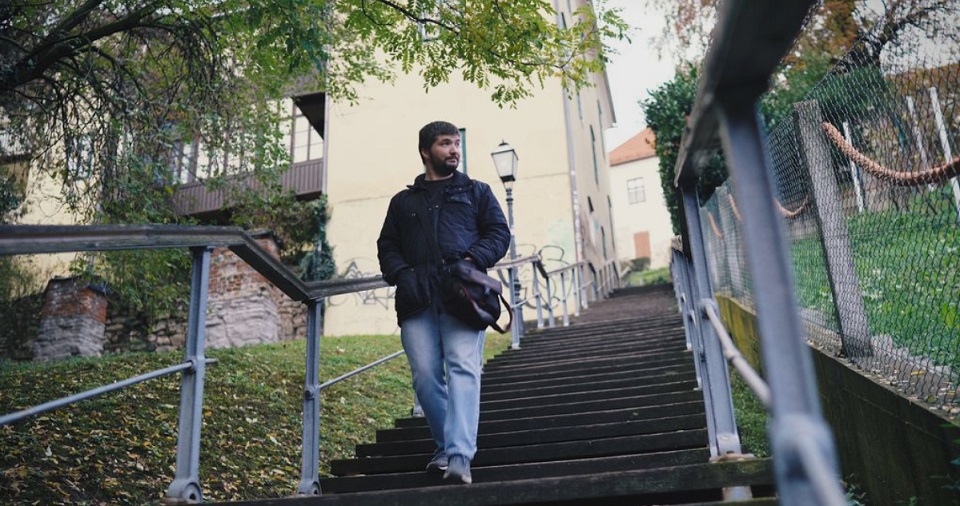
Ivan Brnčić | Dnevnik
Everyone Welcome to Join Facebook Group
People from all over the world are welcome to join the group. In addition to those who fell in love with Zagreb during their short stay for school or work, there are also expatriates in the group who are follow developments in the city. Therefore, the community has an emotional significance for many followers and provides a window into a world that was their home at some point in their lives.
''People recognize our group as a positive place and see something of value in it. Our community brings together people who are total amateurs in photography, but there are professionals too. People who started as amateurs are holding exhibitions now and have grown into better photographers. That is how our community works; to teach people. As they do something, they can learn to do it even better and become more comfortable with themselves,'' Ivan explains.
The 'Zakaj volim Zagreb' community recently celebrated its tenth anniversary. And this was just another opportunity for the group members to gather in the same place at the same time.
Real Life Gatherings and Successful Photography Exhibitions
''I try not only to facilitate a community on the internet, but to socialize in real life as well. We have organized various anniversaries for the birthdays and deaths of our celebrities such as Marija Jurić Zagorka, ban Josip Jelačić, Miroslav Krleža,'' Ivan reveals.
Therefore, for the anniversary of Zagorka's birth, they gathered on one occasion to pay tribute to our greatest journalist despite the pouring rain.
But Ivan is most proud of the group's participation in exhibitions. ''One of our biggest exhibitions takes place at the Zagreb City Museum and was attended by many members. It lasted three months and there were plenty of visitors. The members work was well-received, which could be seen in the comments which visitors left in the book of impressions. That's one of the reasons I love Zagreb and this group. You can see the enthusiasm of all the members because they were part of something so positive for the city. And that’s something that is recognized not only the city but Croatia and the whole world,'' Ivan concluded.
Follow our Travel page and Lifestyle page to learn more about life in Zagreb and the city’s many attractions.


